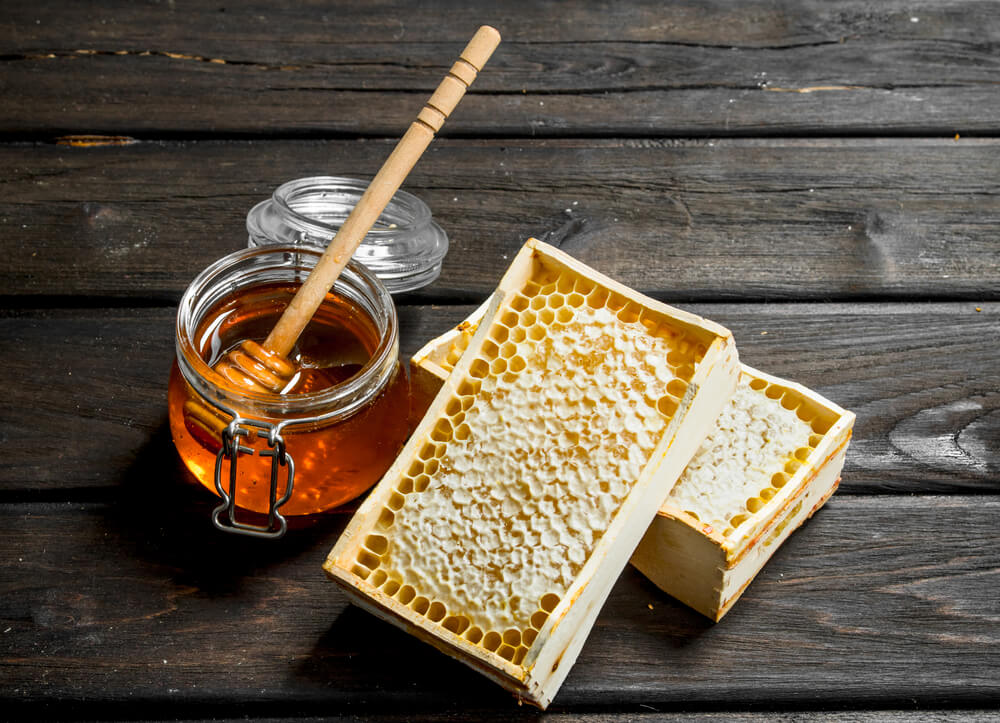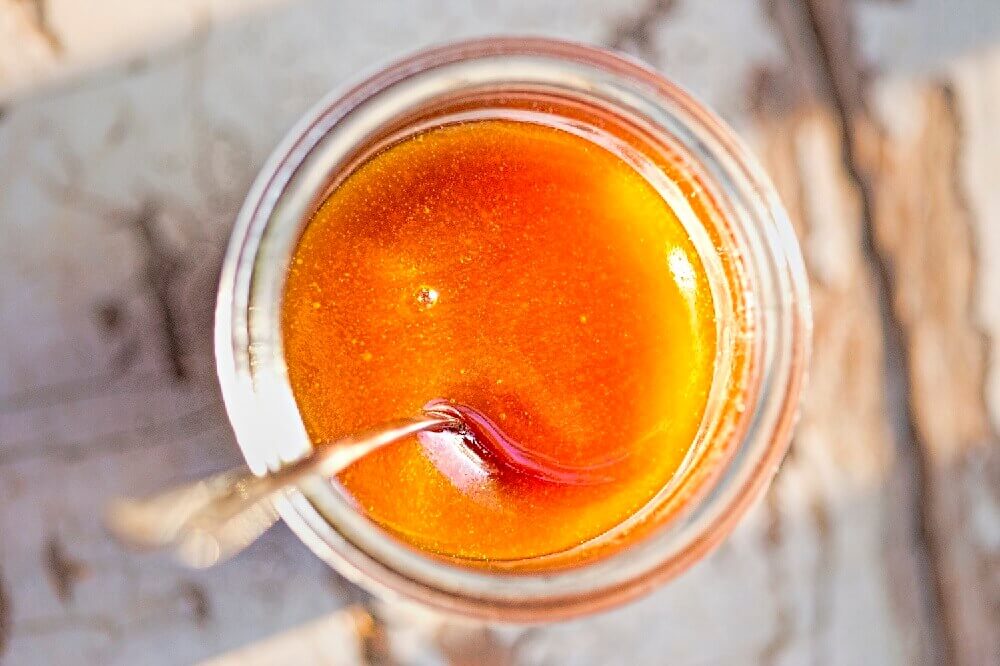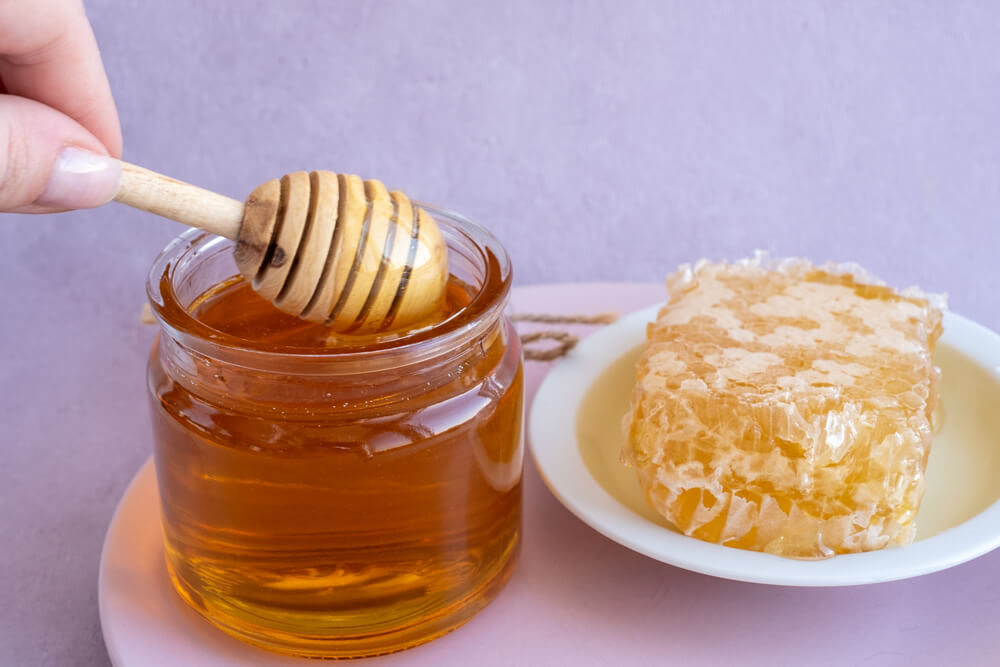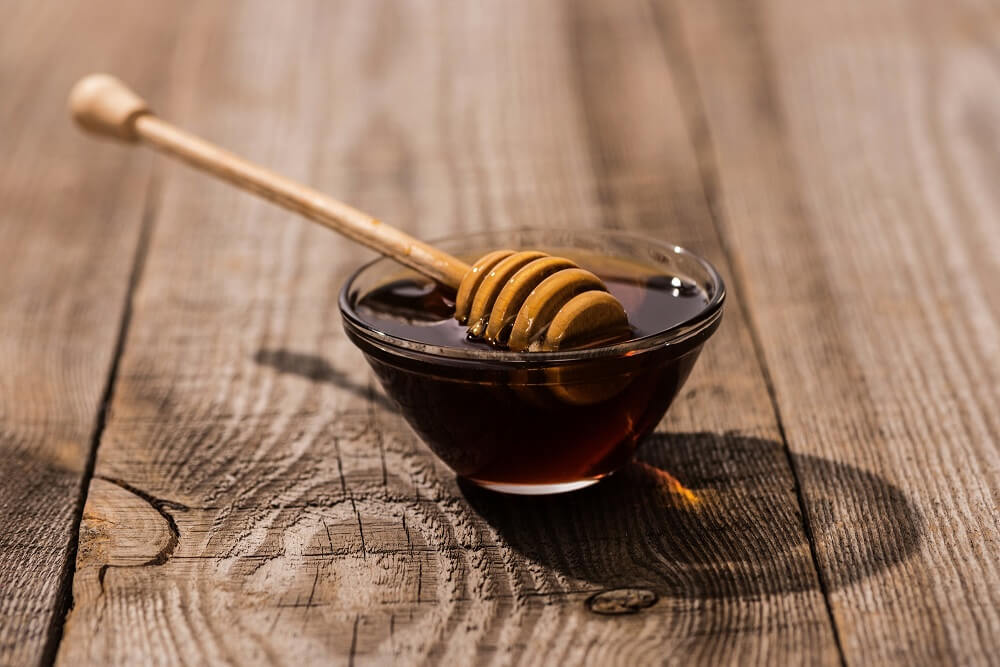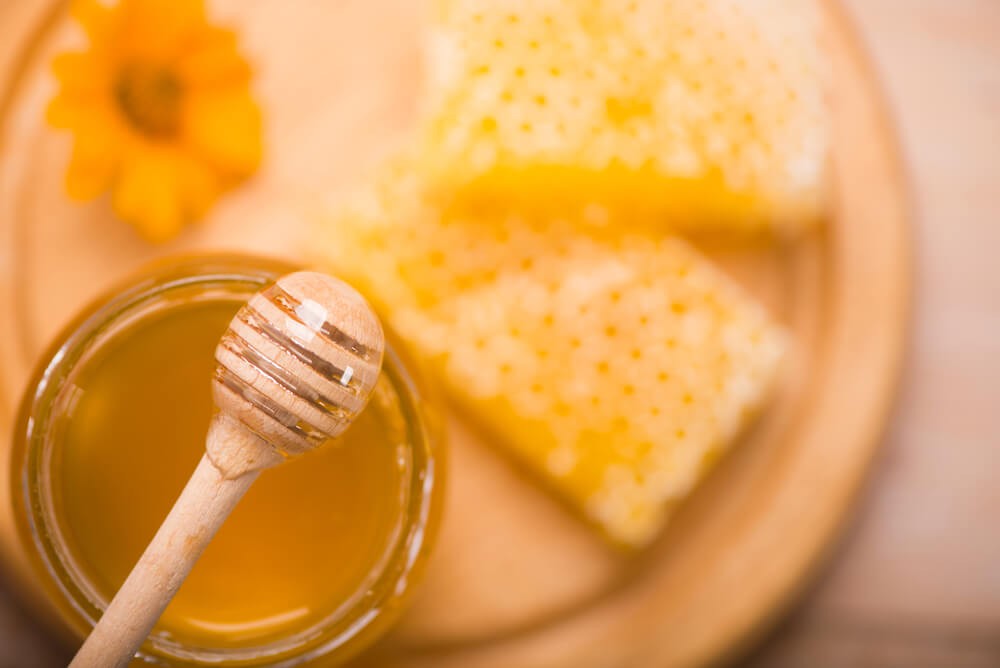Table of Contents:
What is Chestnut Honey?
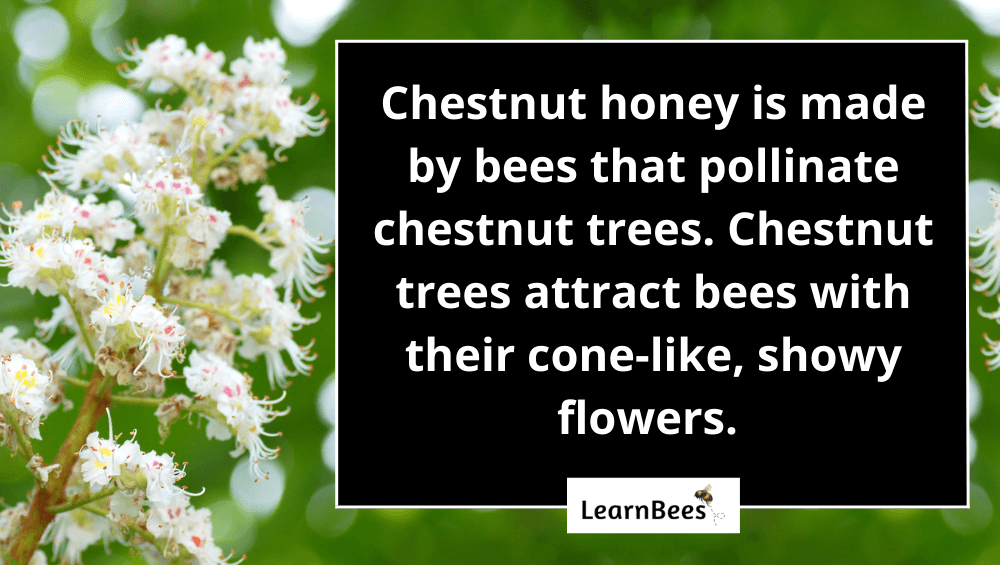
Chestnut honey is produced by honeybees that feed on chestnut trees.
Chestnut trees are native to North America. These trees are known for their cone-like, showy flowers that bloom in shades of pink and white. Honeybees and other pollinators are drawn to their beautiful blossoms.(1)
Speaking of honeybees, you might be asking:
What does chestnut honey taste like?
One word:
Unique.
Raw chestnut honey has a memorable taste that you won’t find in grocery store honey. It has a mild sweetness with a mix of nutty and spicy undertones. It’s a nice balance of sweet and savory.
The color is a deep amber, with a creamy texture that spreads easily on warm toast or biscuits.
And the good news?
Raw honey has antibacterial, antifungal, and anti-inflammatory properties. As a result, it’s been successfully used in clinical settings to treat skin conditions and upper respiratory infections.(2, 3, 4)
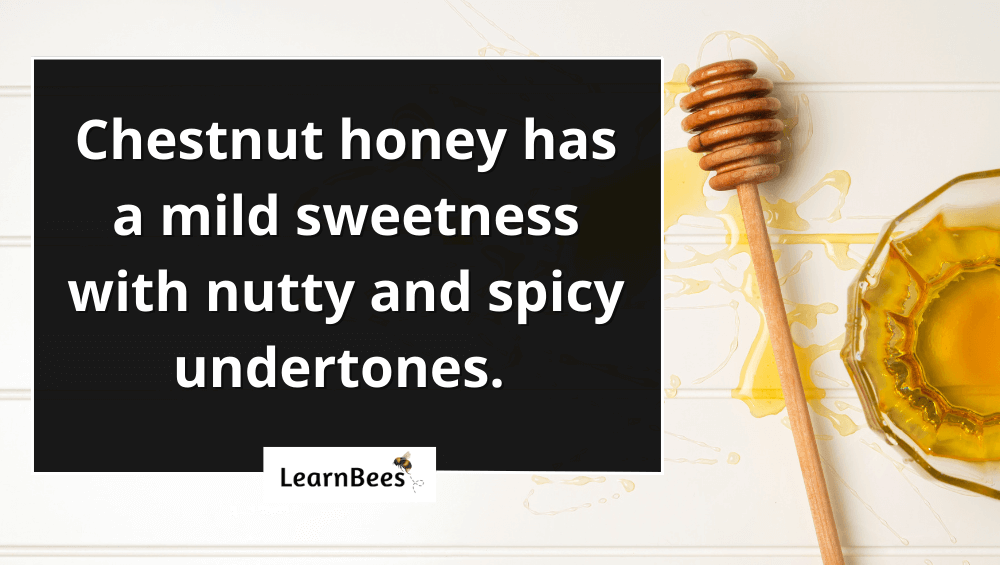
But keep in mind:
These health benefits only come from raw honey.
Raw chestnut honey is unprocessed and unpasteurized honey. It’s kept in its natural form, just the way the honeybees produced it.
But why should you care?
Because according to the FDA, overly processed honey isn’t real honey.(5)
You see, processed honey loses its antibacterial, anti-inflammatory, and antiviral abilities once pasteurized. Additionally, some honey suppliers dilute their honey with artificial sweeteners.(6, 7)
And when this happens?
It’s no longer considered real honey.
So our recommendation is this:
Choose raw chestnut honey over the processed stuff. This gives you the ability to enjoy both the flavor and health benefits of real honey.
And as a general tip, always pick honey bottles that say “raw” on the label.
What Are the Benefits of Chestnut Honey?
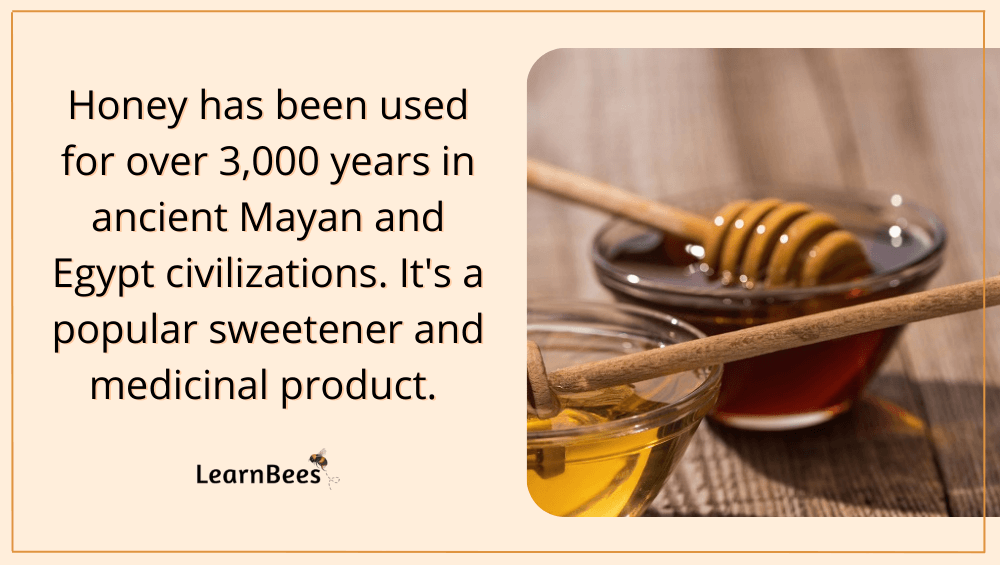
Chestnut Honey Nutrition
A single tablespoon of chestnut honey contains:
- Calories: 60 calories
- Protein: 0 grams
- Fat: 0 grams
- Carbs: 17 grams
- Sugars: 16 grams
So what are the chestnut honey benefits?
Here are a few:
Benefit 1: Honey is a Healthy Source of Antioxidants
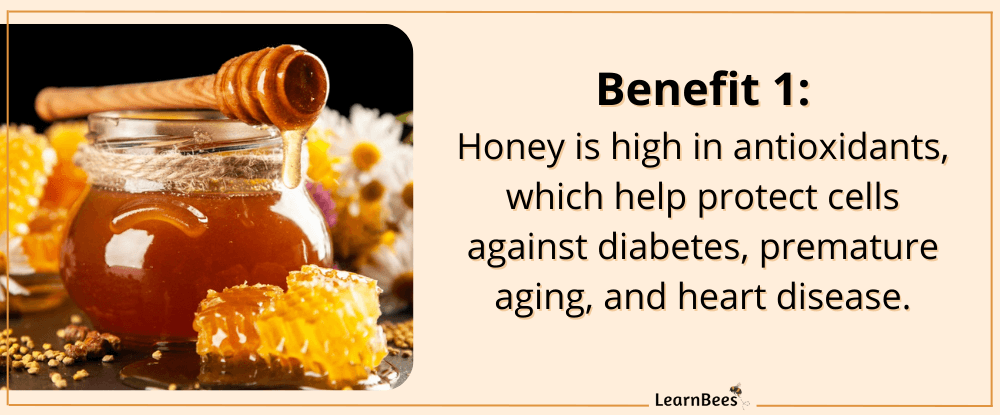
Honey contains antioxidants such as flavonoids and phenolic acids. According to research, these antioxidants may help defend against cell damage. Cell damage can lead to conditions such as type 2 diabetes, heart disease, and premature aging.(8)
Raw honey has anti-inflammatory effects thanks to its antioxidants. As a result, research suggests that honey may help prevent various diseases associated with oxidative stress.(9)
Raw honey also has bee propolis and pollen in it, giving it more health benefits. What’s more, research suggests that raw honey may positively affect the cardiovascular, respiratory, gastrointestinal, and nervous systems.(10)
Benefit 2: Honey Can Treat Skin Conditions and Wounds
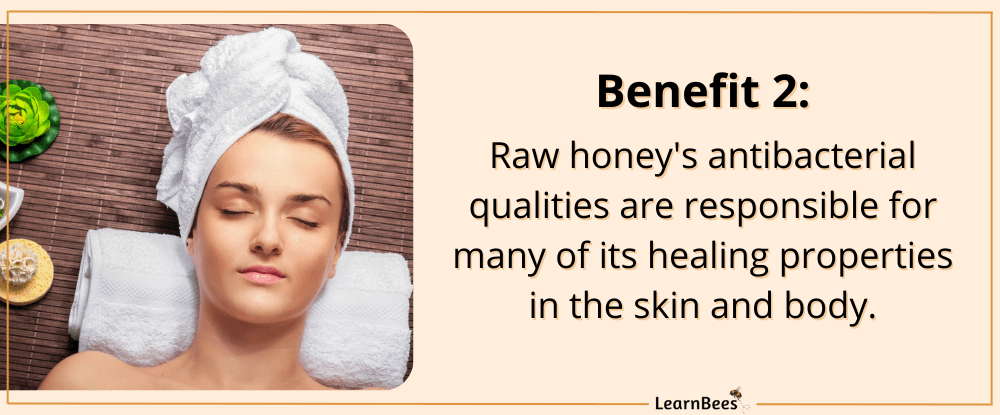
Raw honey has been successfully used in clinical settings as a topical wound treatment. This is because it’s antibacterial, antifungal, and anti-inflammatory.(11, 12)
It’s also been shown to have antimicrobial properties, which can help prevent or slow the spread of bacteria. One study found that honey might benefit health, like inhibiting microbes and assisting wounds to heal.(13, 14)
Honey was discovered in a study to help heal burns and sores that had gotten infected after surgery.(15)
Additionally, raw honey has been a proven treatment for diabetes-related foot ulcers. Foot ulcers are open sores that typically occur at the bottom of the foot. They are serious and can lead to foot amputation.
According to one study, honey had a 43.3% success rate of healing diabetes-related foot ulcers. In a separate study, topical honey was found to heal 97% of participants’ diabetes-related ulcers.(16)
Honey has also been found to help treat other skin concerns, including herpes lesions, as well as psoriasis.(17)
Benefit 3: Honey May Be Good for Heart Health
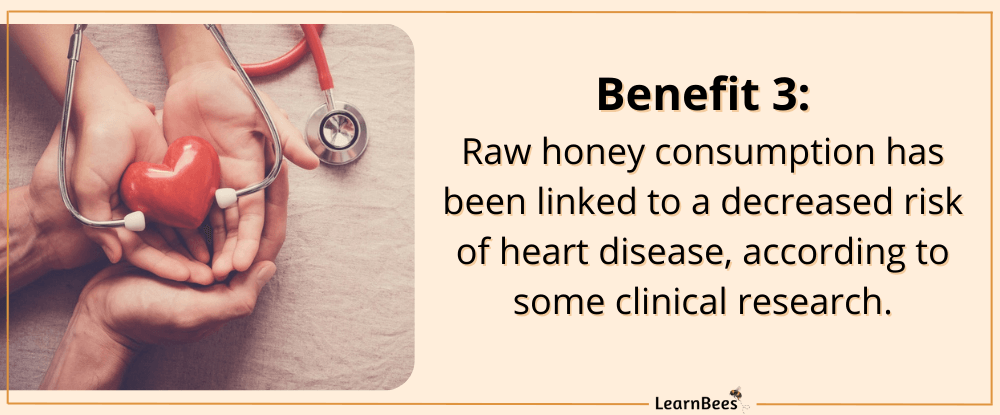
Raw honey has been shown in research to help reduce the risk of heart disease.
According to one research study of over 4,500 individuals, eating honey could reduce the risk of high blood pressure.(18)
In another study, honey showed to regulate the heart, boost blood fat levels, and lower blood pressure. Because of this, honey can help boost overall heart health.(19)
According to a rat study, honey also helped prevent oxidative stress related to the heart.(20)
Raw honey also contains propolis, a compound produced by honeybees from sap-producing trees. Propolis has been shown to have triglyceride-lowering and cholesterol-reducing effects.(21)
Benefit 4: Honey is an Effective Treatment for Coughs and Sore Throats

Sore throats and coughing fits are common symptoms of upper respiratory infections. As a result, these symptoms can disturb the sleep of people suffering from upper respiratory infections.
Raw honey has shown to be a successful treatment of sore throats and cough, with evidence indicating it can be an alternative to cough medications.(22)
Honey has been found to be more effective than diphenhydramine (a cough medicine ingredient) in reducing coughing symptoms.(23)
Raw honey may be used to relieve coughs by reducing the duration of coughing episodes.
Honey has been found in several studies to aid with upper respiratory infections.(24)
According to another study, honey has also improved the quality of children’s and parents’ sleep while suffering from coughs.(25)
Honey, unlike over-the-counter cough medicines, has no negative side effects. That said, it should not be given to infants under one year old because of the danger of infant botulism.(26)
With that in mind, children can safely eat honey once they’re over 12 months old.
What Are the Risks of Chestnut Honey?
Honey is generally safe to consume for the vast majority of individuals. Honey and honeycomb are considered low-risk foods.
So are there any side effects of chestnut honey?
Yes, there are two potential adverse effects to consider:
Risk 1: Honey Can Harm Children under 12 Months
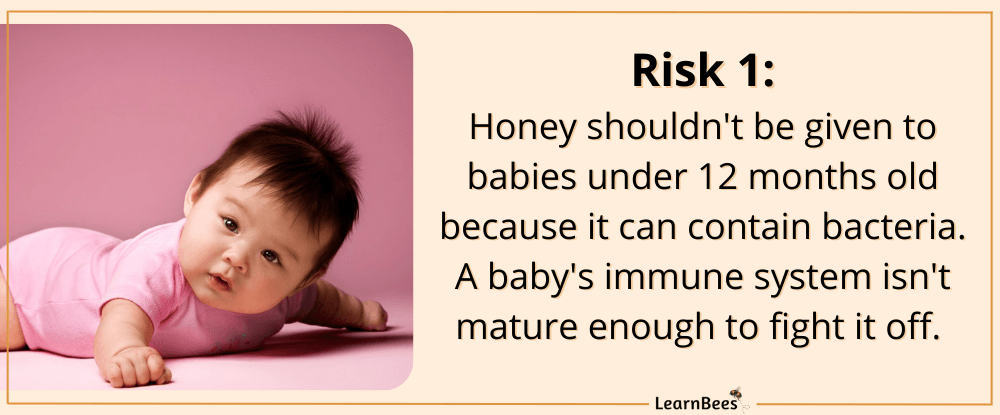
Because honey poses a danger of infant botulism, it should not be given to infants under one.
The bacteria Clostridium botulinum can cause infant botulism, a foodborne illness. It may also affect the nervous system, causing paralysis and respiratory failure.
Honey might be a source of botulism in babies due to their underdeveloped immune systems that cannot fight off the bacteria.
Risk 2: Honey Can Increase Blood Sugar Levels
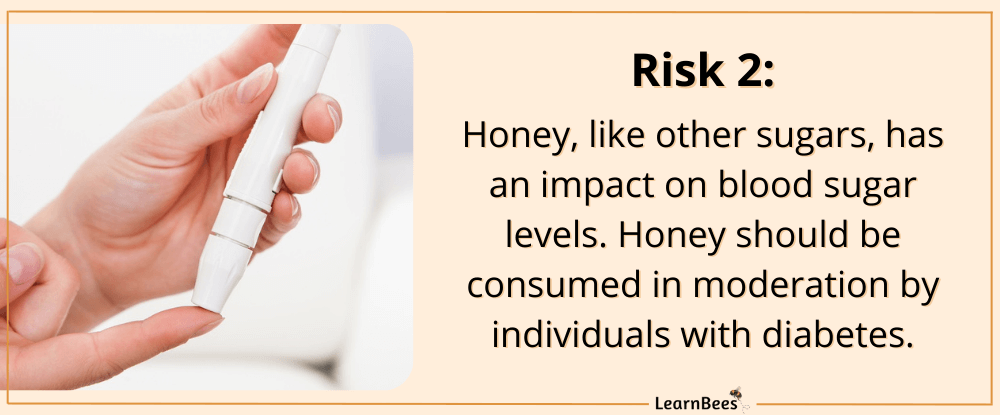
People often ask, “Is honey a healthier alternative to sugar?”
You’ve probably heard that honey is a better sweetener than table sugar. While it’s true that honey has health advantages, it must be used in moderation by individuals with diabetes.
Honey, like all sugars, has the potential to cause blood sugar levels to surge. It also contains carbohydrates that must be considered, especially for people who use insulin.
FAQs on Chestnut Honey
- Does chestnut honey crystallize?
- What is chestnut honey good for?
- What is the taste of chestnut honey?
- Is chestnut honey pure honey?
- Does chestnut honey come from bees?
- Can you buy chestnut honey with honeycomb?
- Is chestnut honey in tea good?
- Is chestnut honey vegan?
- Can chestnut honey be used for weight loss?
- What color is chestnut honey?
- How do you take chestnut honey?
- Is chestnut honey safe?
- Is chestnut honey beneficial to the skin?
- Where can I buy chestnut honey?
- What’s the difference between chestnut honey vs. manuka honey?
Does chestnut honey crystallize?
Yes, chestnut honey crystallizes over time. That said, it can still be eaten even when it’s crystallized. You just need to liquefy it again. To do so, place the honey jar in hot water to reheat its contents and dissolve the crystals, then enjoy.
But remember:
Crystallized honey doesn’t mean the honey has gone bad. In fact, honey doesn’t expire if kept correctly. Crystallization is a natural process that all honey goes through.
Some types of honey crystallize faster than other types. But again, simply reheat the honey in hot water, occasionally stirring until the honey has liquified.
—> Go back to the FAQs on chestnut honey
More to Explore:
What is chestnut honey good for?
Honey is good for many things. It can help with respiratory infections, coughs, and sore throats. Honey is also a good source of antioxidants and enzymes.
Besides that, honey is also good for skin care. It has antimicrobial and anti-inflammatory properties that can help treat skin conditions such as psoriasis, eczema, and dry skin.
—> Go back to the FAQs on chestnut honey
More to Explore:
What is the taste of chestnut honey?
People often ask, “What does chestnut honey taste like?”
Chestnut honey has a rich, nutty flavor with a medium sweetness. It’s a balance between sweet and savory, making it versatile honey for use in many dishes.
—> Go back to the FAQs on chestnut honey
More to Explore:
Is chestnut honey pure honey?
Pure honey is raw honey. That means it hasn’t been processed or heated, and it contains all the pollen, enzymes, and nutrients found in honey. Not all honey is considered pure and raw, so check the label to be sure.
—> Go back to the FAQs on chestnut honey
More to Explore:
- The Top 3 Best Manuka Honey Brands
- Orange Blossom Honey: Uses, Benefits, & Risks
- Sourwood Honey: Uses, Benefits, & Risks
Does chestnut honey come from bees?
People frequently ask:
What is chestnut tree honey? Is chestnut honey honeydew? Do honey bees like chestnut trees?
Yes, chestnut honey comes from honeybees that collect nectar from chestnut flowers. Chestnut honey is considered both honeydew honey and nectar honey.
Honeybees collect nectar from chestnut flowers and then mix it with enzymes in their saliva. From there, the honeybees fan their wings inside the hive to evaporate some of the water out of the nectar, which thickens it and creates chestnut honey.
—> Go back to the FAQs on chestnut honey
More to Explore:
Can you buy chestnut honey with honeycomb?
Yes, chestnut honeycomb is typically available from a local beekeeper or at a farmer’s market. You may also get it from an online retailer.
—> Go back to the FAQs on chestnut honey
More to Explore:
- The Brutally Honest Truth About Sour Honey
- Buckwheat Honey: Uses, Benefits, & Risks
- Can You Eat Honeycombs?
Is chestnut honey in tea good?
Yes, chestnut honey in tea is good. The nutty flavor of the honey pairs well with the taste of many types of tea. You can add chestnut honey to black tea, green tea, or herbal tea.
Simply add a spoonful of honey to your cup of tea and enjoy.
—> Go back to the FAQs on chestnut honey
More to Explore:
Is chestnut honey vegan?
No, honey is not vegan because honeybees make it. However, some plant-based sweeteners can be used as a honey substitute in vegan recipes. Maple syrup, agave syrup, and date syrup are all good options.
—> Go back to the FAQs on chestnut honey
More to Explore:
Can chestnut honey be used for weight loss?
Honey is generally not recommended for weight loss because it’s full of sugars and carbohydrates.
—> Go back to the FAQs on chestnut honey
More to Explore:
What color is chestnut honey?
Chestnut honey has a rich amber color.
With that in mind, the color may vary slightly depending on the type of chestnut tree the honeybees collected nectar from. There are four major species of chestnut trees, so the honey flavor and color may be unique from bottle to bottle.
—> Go back to the FAQs on chestnut honey
More to Explore:
How do you take chestnut honey? How do you eat chestnut honey?
You can eat chestnut honey in several ways. You can eat it straight from the spoon, add it to tea or coffee, or use it as a sweetener in recipes.
One of my favorite ways to eat honey is to spread it on warm buttered toast. It also pairs well on toast with almond butter.
Many people also enjoy adding a spoonful of honey to hot tea or coffee because it dissolves nicely while adding an extra dose of sweetness.
—> Go back to the FAQs on chestnut honey
More to Explore:
- Honey for Skin Benefits: Directions, Uses, & Risks
- 8 Scientific Benefits of Raw Honey
- Allergic to Honey: Signs of a Honey Allergy + Treatment
Is chestnut honey safe?
Honey is typically regarded as a safe food for most people. Honeycomb and honey are both low-risk foods.
There are a few individuals who should exercise caution when eating honey, including:
- Children under 12 months old
- People with diabetes
- People with allergies to pollen and bee stings
Honey should not be given to babies less than one year old since it might lead to infant botulism.
The risk of infant botulism is very low, but the illness can be severe. Honey-related bacteria may cause this illness in infants because their immune system isn’t developed enough to fight it off.
People with diabetes should avoid honey since it can cause blood sugar levels to rise. It’s critical for people with diabetes to watch their blood sugar levels.
Honey is also not advised for people suffering from bee stings or pollen allergies. Because honey bees make the honey, there’s a possibility that the honey may include small traces of honey.
If you’ve got any questions, it’s always a good idea to contact your doctor first.
—> Go back to the FAQs on chestnut honey
More to Explore:
Is chestnut honey beneficial to the skin?
There have been no scientific trials studying the benefits of chestnut honey on the skin. But raw honey, in general, has antibacterial, anti-inflammatory, and antiviral properties.
Some people use honey as a natural remedy for acne, eczema, and other skin conditions. Honey has been successfully used in clinical trials to treat eczema, psoriasis, and diabetic-related foot ulcers.
—> Go back to the FAQs on chestnut honey
More to Explore:
- Why is Manuka Honey So Expensive?
- Cinnamon Honey: Are There Health Benefits?
- How to Substitute Honey for Sugar
Where can I buy chestnut honey?
You may be able to find chestnut honey from a local beekeeper or farmer’s market, depending on where you live. You can also find raw chestnut honey from online retailers.
—> Go back to the FAQs on chestnut honey
More to Explore:
- Honey For Allergies: Is it a Potential Cure?
- Fermented Garlic and Honey Recipe
- What’s the Difference Between Raw and Organic Honey?
What’s the difference between chestnut honey vs. manuka honey?
Manuka honey is made from the nectar of the manuka tree, which is native to New Zealand. On the other hand, chestnut honey is made from the nectar of chestnut trees.
The two honey varieties have different flavor profiles. Manuka honey is known for its slightly medicinal, earthy taste, while chestnut honey is rich, nutty, and mildly sweet.
Manuka honey is more expensive than chestnut honey. There have been clinical trials on the benefits of manuka honey, while there have been fewer on chestnut honey.
That said, there has been no scientific research comparing manuka honey to chestnut honey, so it’s hard to tell if one has more health benefits than the other.
